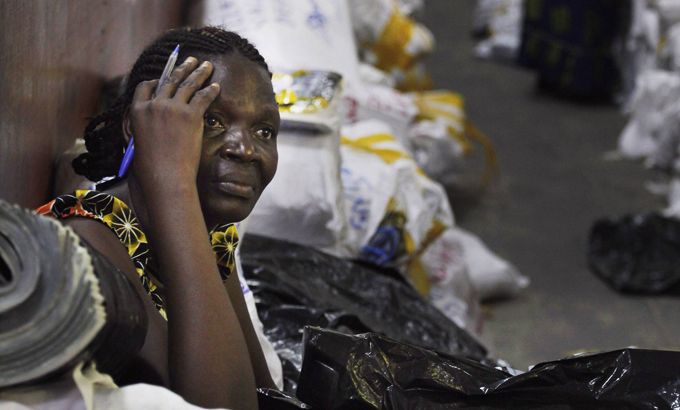DR Congo delays release of vote results
Postponement until at least Thursday comes amid fears of unrest in Kinshasa over outcome of presidential vote.

Kinshasa, Democratic Republic of Congo – The Democratic Republic of Congo’s election commission has postponed announcing the winner of the country’s presidential election by 48 hours, fuelling further tension between the government and the opposition amid claims of irregularities.
“The Independent National Electoral Commission is not in a position to publish the final results today [Tuesday]. The announcement is postponed by 48 hours,” the commission said in a message displayed on state broadcaster RTNC.
The five-year mandate of the incumbent Congolese President Joseph Kabila expired on Tuesday at midnight, and there is much confusion regarding whether or not this move contravenes the country’s constitution.
The latest result projections, announced earlier in the day by the commission, gave Kabila 46.4 per cent with votes from just over two-thirds of polling centres counted. His main rival, Etienne Tshisekedi, has 36.2 per cent.
|
“No one I have spoken to, from any party has expressed any desire for violence, and the onset of violence would mean that talks have broken down.” – Anita Vandenveld, NDI country director |
But opposition candidates, including Tshisekedi, have rejected the results, claiming that the electoral process was a complete sham and calling on supporters to rebuff the results.
An official from Tshisekedi’s UDPS party told Al Jazeera that the electoral commission “must publish the correct results”.
Late on Wednesday the main opposition party welcomed the delay in election results since this would allow time to make the vote more credible.
The government had rushed ahead with last week’s election in an effort to
meet that deadline, despite major shortcomings, including the late delivery
of ballots.
Helicopters had been dispatched to the remote corners of the country to pick up compilation sheets, a spokesman for Congo’s election commission, said.
Meanwhile, David Pottie, from the US-based Carter Center monitoring organisation, said that completing the count [by Tuesday] would take a “tremendous amount of work”.
Pottie told Al Jazeera that the monitoring team had not completed their assessment of the entire electoral process, but had issues with the level of transparency and lack of ready information.
Threat of violence
Security intensified on Monday in the central business district of Kinshasa, the capital, and residents saw an increase in tanks, army personnel and riot police as fears grew of a possible backlash on the streets if Kabila was re-elected in an election which critics say was dogged by irregularities.
At least 18 people have already died in election-related violence in the DRC, according to Human Rights Watch.
As a precautionary measure against possible clashes in the city, hundreds of Congolese flocked to the port on Monday to make a journey across the Congo River to Brazzaville, in neighbouring Congo Republic.
Weekend reports indicated that an estimated 3,000 people had already made the boat trip across the river, in expectation of violence brewing in the city.
City insiders, however, said only a handful of passengers were “boarding the ferry to escape and if the situation really deteriorated, the port will most likely be closed and people will use any means to cross the river … but that not happened yet”.
Rike, 24, a manager of a local nightclub in Kinshasa, told Al Jazeera that she was leaving for four days because “Kinshasa was not the place to be right now”.
Business as usual
Despite the tension, Kinshasa remained bustling with activity on Monday. Businesses were open, the local blue and yellow taxi services ran as per normal and informal traders sold their wares, including fruit and clothes on the city streets.
By early evening, however, the centre of town saw the parade of traffic emptying, with locals rushing home or buying last minute groceries under the twilight.
A manager of a local supermarket in the city centre said that business would open on Tuesday, but would probably close early if there were problems.
Nevertheless, heightened security measures in the city were conspicuous in the absence of white UN vehicles on the streets of Kinshasa after dark, a sign that UN agencies and certain embassies have issued security warnings to their staff urging them not to travel around the city at night.
But Kinshasa is not the only city reported to be on edge.
Officials in Mbuji-Mayi, the capital of Kasai-Oriental province where Tshisekedi enjoys much support, imposed an overnight curfew. In Lubumbashi, in the southeastern Katanga state, the presidential guard has been deployed to deal with security concerns.
While the threat of violence was palpable in some parts of the capital, some observers said suggestions that violence was inevitable were unhelpful and premature.
“It is arrogant to assume that parties are not talking to each other,” Anita Vandenveld, Country Director of National Democratic Institute (NDI), told Al Jazeera.
“No one I have spoken to, from any party has expressed any desire for violence, and the onset of violence would mean that talks have broken down,” she said.
On Monday, the UN stabilisation mission in Congo, known as MONUSCO, led a delegation of diplomats, including ambassadors from Russia and Gabon to hold talks with Tshisekedi.
On Sunday night, Jacob Zuma, South Africa’s president, called the incumbent and two of the main opposition leaders, including Tshisekedi and Vital Kamerhe, and “impressed on them the need for sound leadership and unity at this time”.
“They assured me of their willingness to co-operate and put the country first,” Zuma said in a press statement.